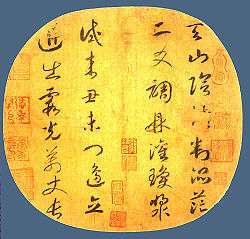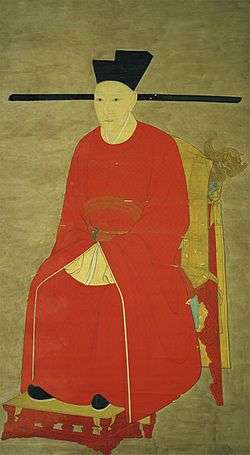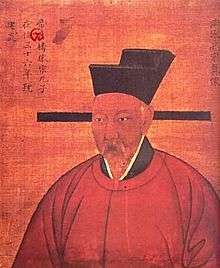Emperor Gaozong of Song
| Emperor Gaozong of Song 宋高宗 | |||||||||||||
|---|---|---|---|---|---|---|---|---|---|---|---|---|---|
 | |||||||||||||
| Emperor of the Song dynasty | |||||||||||||
| Reign | 12 June 1127 – 26 March 1129 | ||||||||||||
| Coronation | 12 June 1127 | ||||||||||||
| Predecessor | Emperor Qinzong | ||||||||||||
| Successor | Zhao Fu | ||||||||||||
| Reign | 20 April 1129 – 24 July 1162 | ||||||||||||
| Predecessor | Zhao Fu | ||||||||||||
| Successor | Emperor Xiaozong | ||||||||||||
| Retired Emperor of the Song dynasty | |||||||||||||
| Reign | 24 July 1162 – 9 November 1187 | ||||||||||||
| Born |
Zhao Gou 12 June 1107 | ||||||||||||
| Died | 9 November 1187 (aged 80) | ||||||||||||
| |||||||||||||
| House | House of Zhao | ||||||||||||
| Father | Emperor Huizong | ||||||||||||
| Mother | Empress Xianren | ||||||||||||
| Emperor Gaozong of Song | |||||||
| Chinese | 宋高宗 | ||||||
|---|---|---|---|---|---|---|---|
| Literal meaning | "High Ancestor of the Song" | ||||||
| |||||||
| Zhao Gou | |||||||
| Traditional Chinese | 趙構 | ||||||
| Simplified Chinese | 赵构 | ||||||
| |||||||
| Deji (courtesy name) | |||||||
| Chinese | 德基 | ||||||
| |||||||
Emperor Gaozong of Song (12 June 1107 – 9 November 1187), personal name Zhao Gou, courtesy name Deji, was the tenth emperor of the Song dynasty in China and the first emperor of the Southern Song dynasty. He was the ninth son of Emperor Huizong and a younger half-brother of Emperor Qinzong. In 1127, during the wars between the Song dynasty and Jurchen-led Jin dynasty, the Song capital Bianjing (present-day Kaifeng) fell to Jin forces in an event historically known as the Jingkang Incident. Emperors Huizong and Qinzong were taken prisoner by the Jurchens, while Zhao Gou managed to escape to southern China. He reestablished the Song dynasty (as the Southern Song dynasty) in Lin'an (present-day Hangzhou) and was proclaimed emperor. He reigned from 1127 until 1162, when he abdicated the throne in favour of his adopted son Zhao Shen (Emperor Xiaozong), and became a Taishang Huang ("Retired Emperor") until his death in 1187.
He was the last descendant of Emperor Taizong to become emperor; subsequent Song emperors were descendants of Emperor Taizu.
Early life

Emperor Gaozong was the ninth son of Emperor Huizong and a younger brother of Emperor Qinzong. His mother, whose maiden family name was Wei (韋), was a concubine of Emperor Huizong. She was honoured as Empress Xianren (顯仁皇后; 1080–1159) after his ascension to the throne.
Emperor Gaozong was originally a prince named Zhao Gou during the reigns of his father and brother. After Emperor Huizong abdicated, his older brother Emperor Qinzong became emperor. He was ordered to the Jurchen camp to negotiate peace by Qinzong but Zhao Gou was held for ransom. He later came back after being ransomed due to the Jurchens' doubts of his identity. After his brother and father and the capital of Bianjing were captured by forces of the Jurchen-led Jin Empire in the Jingkang Incident in 1127 along with majority of the imperial clan members due to his predecessors' incompetence and the imperial court's corruptions, he escaped to Southern China due to being in Cizhou for a diplomatic mission and therefore, not in Bianjing.[1] In order to escape, Zhao Gou had to move province to province in order to escape the Jin troops.
After proving himself to be a competent administrator than his predecessors, he won support from imperial court's remnants of his ascension to the throne; he reestablished the Song Empire (historically known as the Southern Song dynasty) and was proclaimed as Emperor Gaozong in Jiankang (present Nanjing) which at the time was a temporary residence for the remnants of the Song.
Reign

The Da Chu, a puppet state established by the Jin Empire, was abolished when Zhang Bangchang and the regent of Da Chu, the former Empress Meng submitted to Emperor Gaozong, who then ordered Zhang's execution under the pressure of Li Gang. During Emperor Gaozong's reign, the Jurchens often attacked his realm. Initially, he employed military leaders such as Li Gang, Zong Ze, Yue Fei, Han Shizhong, and Yu Yunwen to lead the Song forces to hold off the Jurchens as well as to improve his public image of his declaration to restore the Song Empire to its former glory. However, when one of Li Gang's guerrilla forces, the Red Scarf Army, scored a major victory against the Jin troops and almost captured their commander-in-chief, the emperor dismissed the minister, implied that he do not wanted to win this battle possibly due to that if they win, Emperor Qinzong might be restored.[2]
From 1127 to 1129, the Song sent thirteen embassies to the Jin to discuss peace terms and to negotiate the release of Gaozong's mother and Huizong, but the Jin court ignored them.[3]
Mutiny & First Abdication
In March 26, 1129, Gaozong lost his throne to a mutiny that was instigated by the palace guards led by Miao Fu (苗傅) and Liu Zhengyan (劉正彥) who were unsatisfied with Gaozong's decision to appoint one of their adversary Wang Yuan, to important imperial post hence would outrank them. Miao and Liu banded together with at least ten thousand palace guards under the pretense that Wang and the eunuchs in court were plotting, mutinied and murdered Wang. They then forced Gaozong to abdicate in favor of his two-year-old son Zhao Fu. The plot came to an abrupt end less than a month later in April 30, 1129 when Miao and Liu was defeated by Gaozong's loyal army led by Han Shizhong and were both executed for treason. His son later died from illness after a unofficial reign of 3 months. After being restored to the throne, he was pursued by Jin forces and was not in full control of southern China until the late 1130s.
In 1130, during the Battle of Huangtiandang, when fleeing to the south, he had the newly appointed commander-in-chief, Yue Fei, who was only 27 years old at the time, to help with the defense, and Yue scored a major victory against the Jin armies neared Nanjing. After the Song forces defeated the Jin, they stayed north of the Yangzi River, and Emperor Gaozong declared the city of Hangzhou (known then as Lin'an) as the dynasty's new captial, replacing Kaifeng in 1132.[4]
In November 1133, another puppet state, Da Qi,[5] which had more autonomy than the previous Da Chu[3] invaded the Song. They initially had success but they were defeated and in late 1137, the Jin officially abolished the Da Qi.
When Emperor Gaozong was eventually told of the death of Huizong and Empress Zheng in 1137, he reportedly reacted quite severely, ordering an extended period of mourning.[6]
Treaty of Shaoxing

After years of fighting and significant military success, Emperor Gaozong settled on a pacifist stance.[7] One of the major reasons behind this was that Emperor Gaozong and the chancellor Qin Hui did not want the Song army to defeat the Jurchens, as this might result in his half-brother and the last emperor of the Northern Song Dynasty, Emperor Qinzong who was living in Jin-imposed exile in Manchuria might had a good chance of being recalled to the throne should the Jin Dynasty be destroyed causing Gaozong to lose power. As a result, Emperor Gaozong and Qin Hui plotted to frame Yue Fei for some ambiguous offense and had him put to death. Han Shizhong was also dismissed from his military duties. During Emperor Gaozong's reign in October 11, 1142, the Song and Jin empires signed the Treaty of Shaoxing, which recognised the Jurchens' claims to the former Song territories they already conquered which meant that Emperor Gaozong had to give up all land north of the Huai River, in exchange for peace between the two empires which lasted for seventy years aside from two incidents.[8][9] The Song also had to pay a yearly tribute of 250,000 taels of silver and 250,000 packs of silk to the Jin.[10] The negotiation allowed the emperor's mother and other selected members of the imperial clan returned to Song; Empress Wei then named Empress Dowager in Southern Song. However the treaty designated the Song as the "insignificant state", while the Jin was recognized as the "superior state". Contemporary historians would later blame the emperor for Yue Fei's death and vilified him as a tyrant. However, despite the treaty's terms resulted the Song as a vassal state to the Jin, it saved Song's economy: since the dynasty's founding, the regime lost more capital on military defenses than annual payments to their neighbors, about over three-quarter of state revenue. In addition, with the southern part of China remained under Song's controls, transport of goods became more cost-effectively by boats through streams and canels criss-crossing the region. It also eliminated obstacles on trades, allowing traders import goods between Song and Jin territories.[11][12] Qin Hui, in a reply to Gaozong's gratitude for the success of the peace negotiations, told the emperor that "the decision to make peace was entirely Your Majesty's. Your servant only carried it out; what achievement was there in this for me?"[13]
Emperor Gaozong was also a notable poet and had significant influence on other Chinese poets. Among his surviving works is the Quatrain on Heavenly Mountain.
In 1161, the ruler of the Jin Dynasty, Wanyan Liang declared war on the Song in the Battle of Tangdao and the Battle of Caishi due to him wanting to unify China. The Jin lost the war and it importantly removed the status of the Song as a vassal although they still had to pay tribute. Wanyan Liang was assassinated shortly due to many Jin officers rebelling as a result of the Jin defeat.
Second Abdication
Emperor Gaozong abdicated in 1162 after reigning for more than 35 years, and passed the throne to his adopted son and distant cousin Zhao Shen who then became Emperor Xiaozong, because his only son, Zhao Fu (趙旉), died prematurely around the age of three from an illness. Emperor Gaozong may also abdicated to due his handling of the Battle of Caishi with Wanyan Liang. Emperor Gaozong then assumed the title of Taishang Huang ("Retired Emperor") and remained to hold some power until his death in 1187.
Titles from birth
- His Imperial Highness The Prince of Kang 康王
- His Imperial Majesty The Emperor 皇帝
- His Imperial Majesty The Retired Emperor 太上皇
Family
- Parents:
- Zhao Ji (徽宗 趙佶; 1082 – 1135)
- Empress dowager Wei (顯仁皇后 韋氏; 1080 – 1159)
- Consorts and Issue:
- Empress Xing (憲節皇后 邢秉懿; 1106 – 1139), personal name Bingyi
- Empress Wu (憲聖皇后 吳氏; 1115 – 1197)
- Second rank consort Pan (賢妃 潘氏; d. 1148)
- Zhao Fu (元懿皇太子 趙旉; 1127 – 1129)
- Unknown
- First Princess Kang (康大宗姬 趙佛佑; 1124 – 1127), personal name Fuyou
- Second Princess Kang (康二宗姬 趙神佑; b. 1124), personal name Shenyou
- Third Princess Kang (康三宗姬; b. 1125)
- Fourth Princess Kang (康四宗姬; b. 1126)
- Fifth Princess Kang (康五宗姬; b. 1126)
See also
References
- ↑ Tao 2009, p. 647.
- ↑ Mah, Adeline (2009). China: Land of Dragon and Emperors. New York: Random House, Inc. pp. 108–116. ISBN 9780385737487.
- 1 2 Tao 2009, p. 658.
- ↑ Mah, Adeline (2009). China: Land of Dragon and Emperors. New York: Random House, Inc. pp. 108–116. ISBN 9780385737487.
- ↑ Franke 1994, p. 230.
- ↑ Toqto'a and Alutu (1346), liezhuan di er houfei xia
- ↑ Peter Allan Lorge (2005). War, politics and society in early modern China, 900–1795. Taylor & Francis. p. 55. ISBN 0-415-31690-1. Retrieved March 2, 2012.
He therefore initially brought the belligerent Li Gang back into government to reassure the officials and generals of his intent to resist the Jurchen and perhaps recapture the north, and then sacked Li and brought in officials more concerned with Gaozong's personal authority. The military situation began to change, however, as Song loyalist forces became more coordinated and competent generals emerged to deal the Jurchen several defeats. Jurchen armies also began to run into the usual operational problems that diminished the power of steppe armies on extended campaigns. Even in economically-developed areas, an army that lived off the land could not return through the same place it had just looted. As Jurchen soldiers became more encumbered with loot, they became less mobile and less interested in further campaigning, though they might be more willing to return in the future. Southern China was also much less favorable for cavalry than northern China, and the Jurchen had to cross not only numerous small rivers and canals but also the Huai and Yangzi rivers.
- ↑ Franke 1994, p. 235.
- ↑ Hymes 2000, p. 34.
- ↑ Beckwith 2009, p. 175.
- ↑ Ebrey, PatriciaCam (1996). China. New York: Cambridge University Press. pp. 138–150. ISBN 052166991X.
- ↑ Franke 1994, p. 234.
- ↑ Tao 2009, pp. 688–689.
Emperor Gaozong of Song Born: 12 June 1107 Died: 9 November 1187 | ||
| Regnal titles | ||
|---|---|---|
| Preceded by Emperor Qinzong |
Emperor of the Song Dynasty 1127–1162 |
Succeeded by Emperor Xiaozong |
| Honorary titles | ||
| Vacant Title last held by Emperor Huizong |
Retired Emperor of China 1162–1187 |
Vacant Title next held by Emperor Xiaozong |